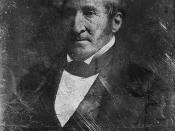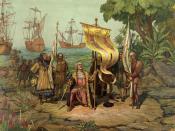Among other oxymoronic phrases that have been passed down through the ages in our history, a few stand out as being perhaps more moronic than others. One of these is Civil War. It came to prominence as oxymoronic in the decade of the 1850's, known by many as The Fateful Decade in our national history. The cess- ation from the Union, and bloodshed among brothers and sons, came all too swiftly in the next decade. The roots of the conflict go back well before the first slavery practised in this hemisphere by a European, Columbus. The final straws which broke our ancerstor's backs were piled on in the 1850's.
There is nothing really civil about war between peoples of the same country.
Yet, we have had a number of such events in this nation; the last and largest of which is still ongoing in the hearts and minds of some of our countrymen.
The very earliest settlers of this hemisphere competed for hunting, fishing and gathering rights. In time, they competed for settlement rights and dominion over territory. For instance, the five nations of natives that peopled what is now much of New York State, Ohio, Pennsylvania and part of Ontario made war continuously with their neighbors before coming to an agreement in probably the mid-1300's. This agreement was fostered by two great Iroquois leaders of history known to us as Hiawatha, (not the Hiawatha of Longfellows' poetry), and Dekanaweda. They brought together the Five Nations of the Mohawk, Oneida, Onondaga, Seneca and Cayuga, thus forming the Iroquois League of Nations. That ended the warring among themselves, but made it now possible to make war against other peoples. Eventually, they adopted the Tuscarora people, bringing them into the League as a Sixth Nation.
The Iroquois League tried to remain...


